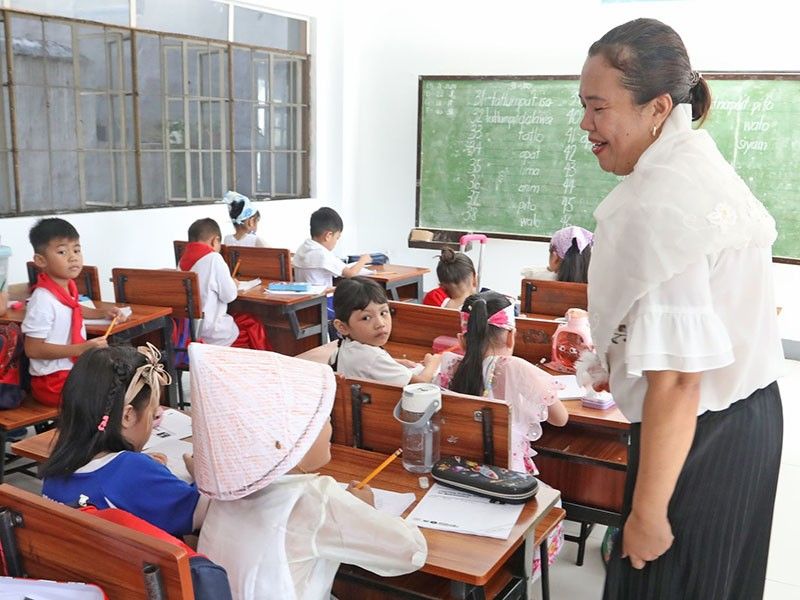How chronic underfunding killed the once-celebrated mother tongue education

MANILA, Philippines — The government's axing of mother tongue instruction for kindergarten to grade 3 has drawn protests from education experts and advocates, who assailed officials for simply ditching the policy rather than fixing its funding and implementation issues.
Two faculty members of the University of the Philippines Diliman who specialize in language studies and education, as well as Filipino advocacy group Tanggol Wika, believe the recently passed law discontinuing the use of mother tongue in early education has stymied the program's potential benefits before they could be fully realized.
The bill, which downgrades mother tongue instruction as an option in class, lapsed into law last week without the president's signature.
For years, debates over the value of a nationwide policy compelling the use of mother tongue (language first learned at home) in classrooms have drawn a rare divide in the education sector.
Studies on the program show mixed results. Data the Department of Education (DepEd) presented in congressional hearings found no evidence that mother tongue education benefited multilingual classes with diverse home languages. In contrast, research on monolingual classes—where all students share a home language—painted the opposite picture.
But the very inclusion of the mother tongue in the K to 12 curriculum was not without basis. A briefer from DepEd itself in 2016 which cited experiments in Iloilo and Rizal from 1948 to 1966 show students taught in their native language mostly outperformed those taught in English.
What went wrong? The consensus among education experts, even before the passage of the law removing the mother tongue policy, was that DepEd was simply ill-prepared to implement it on a national scale: structure-wise, personnel-wise and budget-wise.
Implementation, funding hiccups
"While using the child’s first language in instruction is consistent with theories in pedagogy, it has been difficult to implement due to the highly centralized structure of DepEd," said the Second Congressional Commission on Education (EDCOM 2) in its Year One report. EDCOM 2 led the filing of the bill that discontinued the use of mother tongue instruction from kindergarten to Grade 1.
Under the soon-to-be-defunct Mother Tongue-Based Multilingual Education (MTB-MLE), which was legislated through the passage of the K to 12 law, DepEd used 19 languages. This includes Tagalog, Kapampangan, Pangasinan, Iloko, Bikol, Ybanag, Sinugbuanong Binisaya, Hiligaynon, Waray, Bahasa Sug, Maguindanaoan, Maranao, Chavacano, Ivatan, Sambal, Akianon, Kinaray-a, Yakan and Sinurigaonon.
"Top-down, DepEd assigned official mother tongue for each area without language mapping and allowing flexibility and giving guidance to multilingual areas," said Mercedes Arzadon, a faculty member of the University of the Philippines College of Education.
Arzadon, who has long specialized in mother tongue education research, also pointed to the lack of specialists in the department to lead the overall implementation of MTB-MLE.
"There has been no champion or expert for Multi-Language Education (MLE) from within the system. For a long time, it was led by a division with limited power. I wish there could have been at least a consultant," Arzadon said.
She added that a former regional director and assistant secretary who studied the principles of the program after leaving the department "said it's his first time to understand the program."
"If only there had been funding, they could have created a task force like they are doing now with the PISA. This would have allowed for the development of materials appropriate for the language and for training teachers," Arzadon said, adding only Grade 1 teachers were invited to mass training for MTB-MLE in 2011-2012. Meanwhile, the remaining teachers received training at the local level depending on available resources and initiatives of MLE focal persons.
Amid criticisms that DepEd was too centralized in its approach to mother tongue education, Arzadon said the department could have created supervisor positions focused solely on mother tongue instruction. Instead, the policy became "extra work" for Filipino and English supervisors.
She also noted the long hours that DepEd's MLE focal persons put into creating primers on using the mother tongue to bridge to Filipino and English. "These transfer primers were just completed, and I hope they will still be used," she said.
Recipe for success. In a 2008 report that aimed to build on the momentum of the growing pushback against "pro-English proponents" in education, then-Komisyon ng Wikang Filipino Chairperson Ricardo Nolasco set out four conditions that he said would guarantee mother tongue education's success.
"One, there has to be a good curriculum, one that is cognitively demanding. Two, we will need good teachers who are competent in the required language, content and methods," Nolasco said.
"Three, there must be good teaching materials (i.e. error free). Four, community support and empowerment must be present," he added.
Over a decade later, in a Senate hearing in 2022, DepEd bared that only 78,872 of its targeted 305,099 educators were trained for the use of the mother tongue as a medium of instruction.
State think tank Philippine Institute of Development Studies also found in a study that less than 10% of over 16,000 schools it analyzed had fully complied with the main aspects of the MTB-MLE implementation, namely in orthography, grammar, learning resources and dictionary.
This is why Tanggol Wika said it sees the "abolition" of MTB-MLE as a step backward, when documented evidence of DepEd's shortcomings had long been public knowledge.
"Any shortcomings in the implementation of MTB-MLE from 2013 to 2023 should not be blamed on the program itself but on the lack of funding for the education system," the group said in Filipino.
The lack of learning materials and insufficient training for teachers "results directly from the failure of Malacañang" to make the once-celebrated policy a success, the group added.
"Previous DepEd secretaries did not address the reasonable demands of teachers concerning MTB-MLE and the entire education system. The positive impact of MTB-MLE would have been more significant if the government had fully funded all the necessary components for its proper implementation since it began in 2013," it said.
Impact on everyday life. Removing mother tongue instruction, for Aldrin Lee, a linguistics professor who published an open letter on the matter, was tantamount to subjecting students to the "forced use of English" already seen in several facets of public life.
From attending court hearings to applying for jobs, Filipinos are forced to use English, a language not their own, he said.
"The new ideas they conceive and develop using our language require them to think about how to translate them into English, leading many to simply abandon their thoughts if it seems too difficult," Lee said, adding: "English is a significant barrier to the growth of Filipino knowledge."
While the new law appears to favor Filipino, Tanggol Wika said it is "closer to maintaining the status quo of an English-centric language policy" as it does not require the use of Filipino outside of subjects where it is already used.
"Initiatives related to MTB-MLE have been a lifeline for several endangered languages in the Philippines; thus, the murder of MTB-MLE seems like a murder of these endangered languages as well," the group said.
What's next?
Arzadon believes the four conditions Nolasco set for mother tongue education to be a success is happening, "but it takes time to see results because we are talking about 47,000 schools." She added: "For example, in a district in Benguet, many people were initially angry about the changes but later accepted them."
"Maybe it’s about community support and empowerment because you can’t rely on DepEd alone for such a radical change. There needs to be strong support for multilingualism from the government, media, and other sectors," she added.
The way forward now is for regions and provinces that "worked hard to make it happen," such as Bicol Region and Western Visayas, among others, to hopefully continue implementing the program, Arzadon said.
Whether or not schools and teachers will — on their own and without the impetus to do so — build on their gains remains to be seen.
But the unspoken loss is clear: the Philippines was the first in Southeast Asia to have a law that explicitly calls for the use of mother tongue education.
Now, it is one of the many that do not have one.
- Latest
- Trending





























